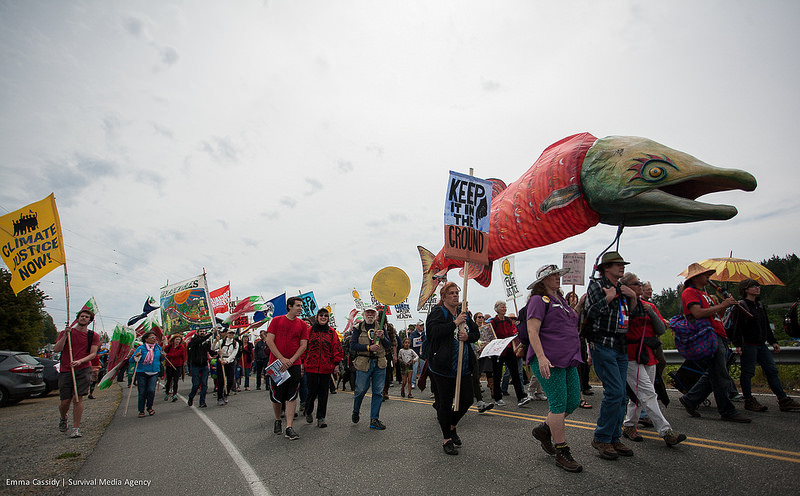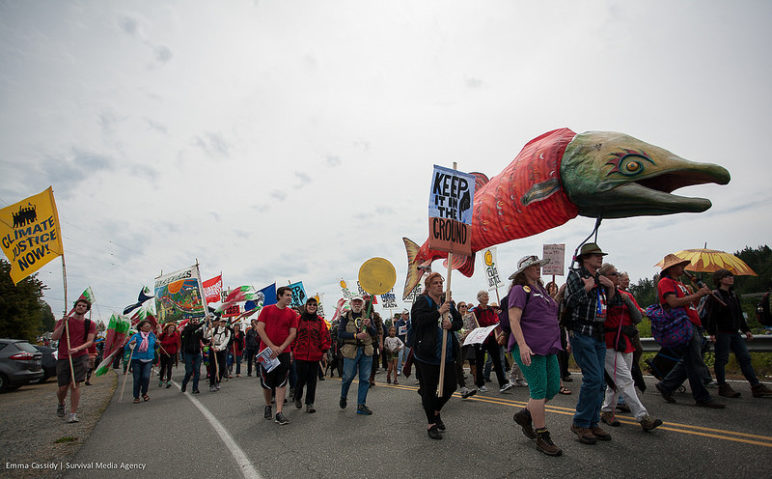In the final weeks of 2016, Portland moved to the forefront of the Thin Green Line—the Northwest’s opposition movement to coal, oil, and gas exports—when its city council voted unanimously to prohibit building new fossil fuel infrastructure in the city. The vote is likely the most aggressive anti-fossil fuel move by any government in North America. And with it, Portland is charting a course for local governments in the Northwest and beyond to use their powers to secure a future free of the economic whiplash, environmental degradation, and the health and safety threats that are endemic to the fossil fuel industry.
Portland is the clear leader in opposing coal and petroleum development, but it’s hardly alone.
Fittingly, the initiative was born of a fight over a proposed propane export terminal. Just as the project looked certain to win approval, Portland Mayor Charlie Hales, formerly a backer of the project, reversed course in response to scrappy but determined opposition from local activists. He refused to put the proposal on the City Council agenda, effectively killing the project in June 2015. Hales then became a champion of a new movement to deploy the city’s land use law to effectively ban new and expanded fossil fuel developments in the Rose City. By November 2015, the city council had passed a resolution to “actively oppose expansion of infrastructure whose primary purpose is transporting or storing fossil fuels in or through Portland or adjacent waterways.” Then, after a year of study and analysis, the council began moving forward with a land use ordinance that sharply limits the expansion of existing terminals and prohibits new fossil fuel facilities.
The result is a comprehensive new ordinance passed into law on December 14, 2016. It prohibits new “bulk fossil fuel terminals,” defined as terminals with marine, rail, or pipeline transport access, as well as “trans-loading” facilities (such as train-to-ship operation) or facilities with storage exceeding two million gallons of fuel. The law takes aim at the whole range of fossil fuels: petroleum products (both crude and refined), coal, and gaseous fuels (such as natural gas, methanol, and propane). The law reins in expansions at ten existing petroleum terminals and one LNG plant. Ethanol and biodiesel are exempt.
Portland is the clear leader in opposing coal and petroleum development, but it’s hardly alone.
Whatcom County, Washington
Hot on the heels of Portland’s success is Whatcom County in northwest Washington. On September 27, 2016, the County Council extended for six months emergency Ordinance 2016-039, which prevented county agencies from accepting applications and permits for new or expanded facilities with the primary purpose of shipping out “unrefined fossil fuels” in the Cherry Point urban growth area, if not processed or consumed at facilities there.
Cherry Point has been the site of intense energy industry development, including two oil refineries and a proposed coal export terminal, and Whatcom County’s ordinance includes both crude oil and coal, along with methane, propane, butane, and all forms of unrefined natural gas. The initial moratorium passed unanimously, and even its renewal earned just one dissenting vote—all despite opposition from BNSF Railway, two Republican state legislators, and the Northwest Jobs Alliance, a trade group that formed to support Northwest coal export projects. With the extension in place, the table is now set for Whatcom County to reproduce for the Cherry Point area something similar to what Portland accomplished.
Whatcom County Planning Commission is currently studying changes to the county’s 20-year comprehensive plan, the guiding document for land use and development, with a recommendation due by mid-January 2017. Planners are also considering amendments that would ensure future developments in the area meet a number of standards that are considerably more protective than those in place now. For example, the proposed amendments would encourage clean-energy and low-carbon-polluting industries; would encourage future developments or expansions within the Cherry Point urban growth area to avoid estuaries and wetlands; and would require new development to undergo archeological review. (The area contains a Lummi Nation ancestral village dating back more than 3,000 years.) Additionally, any new water-intensive development would be encouraged to use the best available technology to minimize water consumption. (The proposed amendments are, however, a bit diluted from language the County Council put forth in July 2016, which called for strict avoidance of estuaries and wetlands, prevention of additional shoreline hardening, and cooperation with Lummi Nation on archaeological research as part of the permitting process.)
Draft amendments that the county will consider also include language to reduce the risk of oil spills, protect shoreline ecological functions, and prevent interference with traditional and commercial fishing by limiting export docks or piers to those already approved. Further, the county pledges in the proposed amendments to encourage federal agencies to enforce the provisions of the Magnuson Amendment, which limits oil tankers in Puget Sound, as well as additional recommendations to limit unrefined fossil fuels at Cherry Point by December 2017.
The planning commission held a public hearing on the proposed amendments on December 8, 2016, and will continue the process with a public “work session” on January 12. Industry representatives have weighed in with their own ideas, and BP has begun a media offensive against the proposed changes to the comprehensive plan.
Smaller Northwest towns have also moved decisively against fossil fuels, although the reforms have generally been more narrowly defined.
Hoquiam, Washington
In August 2015, the City Council of Hoquiam, Washington, approved amendments to the City Code that prohibit bulk oil storage. It was a surprising move, given that the local port had entertained no fewer than three viable oil-by-rail terminal proposals since 2012, projects that in aggregate could have handled more than 160,000 barrels of crude oil per day.
The official process began on March 6, 2015, when Hoquiam Mayor Jack Durney sent two resolutions to City Council, including one to establish a moratorium on new oil facilities while the City revised its land use plan. The Mayor’s letter indicated that he had come to the conclusion that “wholesale liquefied petroleum storage and sales facilities are not compatible with our lifestyle, our safety, or our current and future economy.” He encouraged the Council to “change the future” of the City, which is located near three recent oil terminal proposals at Grays Harbor and was impacted by the Nestucca oil spill, one of the largest spills in Washington state’s history.
The intent of the amendments was a comprehensive defense against crude oil development: it aimed to prohibit the licensing, regulation, location, and permitting of wholesale liquefied petroleum storage, handling, and sales facilities. In practice this meant creating definitions for bulk crude oil storage and handling facilities and updating the City’s legal land-use table to reflect restrictions on this use. (Although planners initially drafted a prohibition on “sales,” the hearing examiner recommended removing that term, so the final recommendation limited the focus of the amendments to storage and handling.) The amendments do not prohibit the development of facilities that handle and store refined or finished products derived from petroleum, such as kerosene or gasoline.
Aberdeen, Washington
About a year later, on July 13, 2016, Hoquiam’s next-door neighbor on Grays Harbor took the same step: Aberdeen’s City Council unanimously made permanent a moratorium on bulk crude oil storage and handling facilities. The city’s temporary moratorium had been passed a year earlier by a 9 to 2 vote. The new Ordinance (No. 6594) amended and added language to the Municipal Code prohibiting bulk crude oil storage and handling facilities in all zoning districts within the City of Aberdeen. The law does applies neither to biofuels nor to finished products derived from petroleum.
Vancouver, Washington
A week after that, Vancouver, Washington, moved in the same direction as Aberdeen. Threatened by the planned development of North America’s largest oil-by-rail facility, Tesoro’s Vancouver Energy project, the city council on July 18, 2016, approved an ordinance to amend the Municipal Code to define and then prohibit new crude oil storage and handling facilities and to limit the expansion of existing facilities that average fewer than 50,000 barrels a day. The ordinance also prohibited new oil refineries.
An emergency moratorium had already been in effect in Vancouver since September 2014, a measure passed in response to a firestorm of public opposition to Tesoro’s proposal. In their July 2016 debate, councilmembers disagreed over global warming in their debate but unanimously approved the measure, reasoning that it would protect the safety of residents.
Spokane, Washington
Shortly after the June 3, 2016, oil train derailment in Mosier, Oregon, the Spokane City Council voted unanimously to place a measure on the November 2016 ballot asking voters to prohibit rail shipment of crude oil or coal through the city, and to impose a fine of up to $261 per tank car for such shipments. Voters never got the chance to weigh in on the measure, though, as three weeks later, the Council voted 5-2 to withdraw it, acknowledging that the measure would almost certainly not survive a legal challenge.
Spokane made a second attempt in October 2016 when councilmember Breean Beggs filed a new citizen’s initiative to the people for the November 2017 ballot, this one targeting the owners of rail cars and not the rail companies directly, as in the original proposal. Beggs’ initiative would amend the municipal code to prohibit the shipment of oil and uncovered coal in specified zones of Spokane, including downtown, near the Spokane River, and near schools and hospitals—all areas near the busy rail lines that run through the heart of the city. City staff and other observers re
main concerned that the proposed measure would be preempted by federal law. Spokane‘s hearing examiner has even criticized it on legal grounds, but that won’t stop it from going before voters in November 2017 if backers can collect 2,700 signatures from local voters by July.
What’s Ahead
In the coming years, local governments are likely to play an increasingly critical role in preventing the development of new fossil fuel projects. Reforms to city and county land-use law to prohibit these uses can send a clear signal to big coal, oil, and natural gas that communities don’t want them for neighbors. They can also be the legal teeth that actually prevent the energy industry from building these projects. In a future article, we will explore how much force these amendments have, and we will take a look at some of the hurdles that local governments face in trying to stand as the Thin Green Line.
Thanks to Kristen Boyles, Dan Serres, Eddy Ury, and Jasmine Zimmer-Stucky for reviewing draft portions of this article.














Don Steinke
Thank you Eric, Tarika and the rest of the Sightline team.
I borrowed some of your language in this LTE.
http://www.columbian.com/news/2017/jan/13/letter-kudos-to-thin-green-line/
LaDonna Robertson
Do you know if Marilyn Strickland, Mayor of Tacoma, signed this letter? Because the Port of Tacoma and the City of Tacoma are in cahoots with Puget Sound Energy (Australian-owned by Macquarie Investment Group) for the construction and implementation of an LNG Plant, which is major greenwashing in this area. Tarika is aware of this and now we’re hearing NWIW is coming back into our Port of Tacoma to bring back their fracking activity for consumerism. Both entities are engaged in fossil fuel activities going against what the residents of Tacoma need and want. Please let me know. Thank you!
LaDonna Robertson
I see Tacoma, WA, was added to the following list and I in disbelief that Mayor Strickland of Tacoma could have signed the Mayor’s Letter knowing what we know in the City of Tacoma and the struggle we’ve had with trying to obtain an SEIS with the mayor (totally being ignored) and the Port of Tacoma Commissioners. This is obscene and Marilyn Strickland is not being truthful with their plans for profit over people. The public is barely listened to and transparency leaves a lot to be desired with all their closed meetings. I want Sightline readers to know this is a complete falsehood. Just read about this at redlinetacoma.org.
Jason
I find it a little myopic and representative of binary thinking to defend a complex position with a platitude like ‘profits over people’. Even if you believed in some sort of absolute truth that could place such projects in a binary category of ‘good’ or ‘bad’, or conclude that a project is categorically ‘bad’ for the interests of society in the Northwest, the discussion still lacks comment on the specifics – what are the arguments for each side? For example, in New York City in 2013, after 7 years of acting as an obstacle to infrastructure expansion, the city literally almost ran out of natural gas. The price spiked from $4 to $113. When you can’t heat homes, people die. How does this factor into the arguments of some of these extreme binary types of positions. ‘No fossil fuel at any cost!’ is not a credible nor legitimate position. Moderation, viable alternatives are much more worthy of discussion.